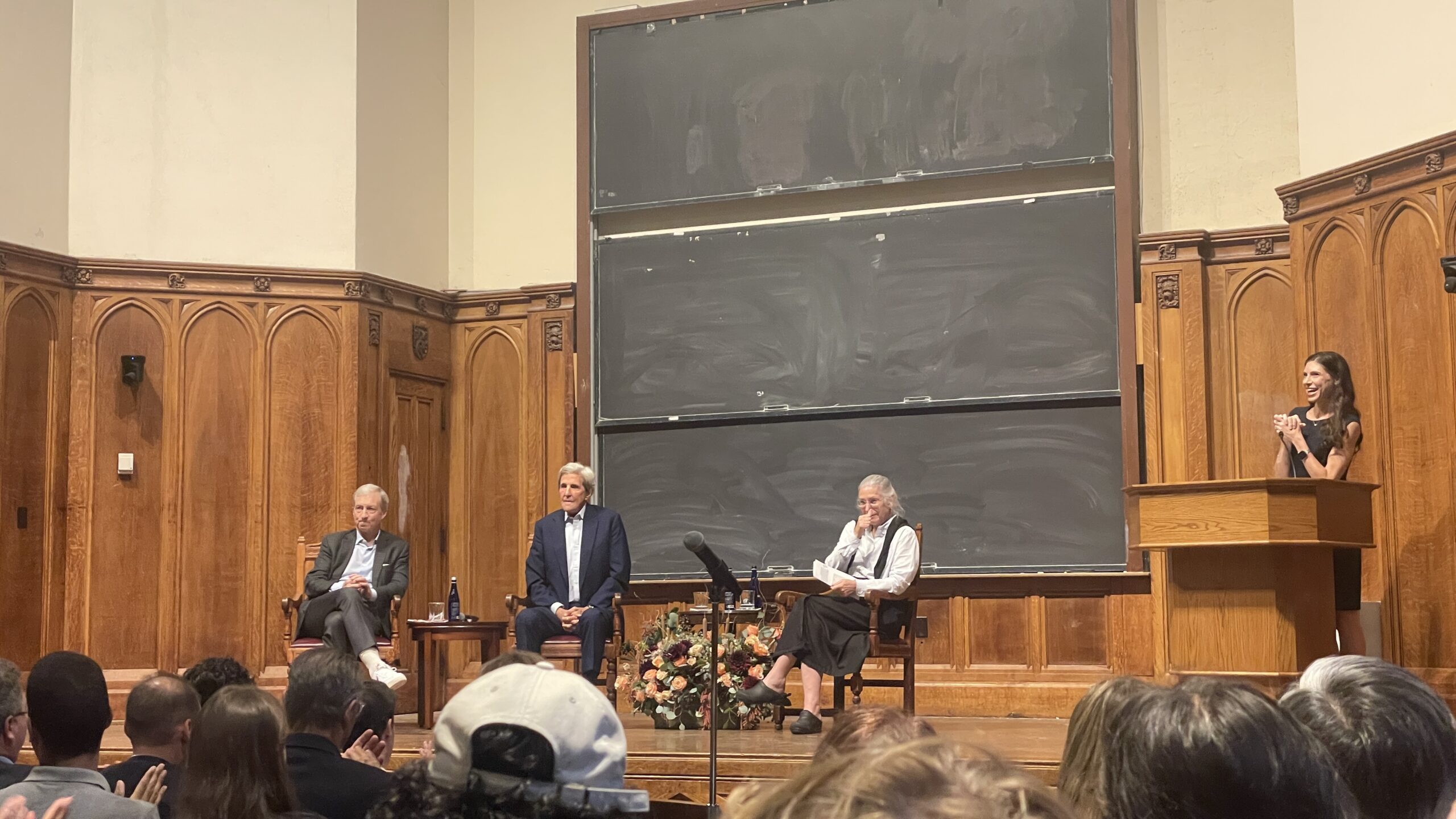Tom Steyer, John Kerry tout climate optimism at campus talk
The billionaire investor and former secretary of state addressed a packed lecture hall and talked about the power of the market to reshape green initiatives.

Kinnia Cheuk, Contributing Photographer
Tom Steyer ’79, billionaire investor, climate advocate and former Democratic presidential hopeful, doesn’t think that there will be bipartisan agreement on climate change in the United States anytime soon.
Instead, Steyer thinks another force will push the nation to act on climate change even without explicit bipartisan agreement — the market.
“We all can bipartisanly agree that we don’t like to lose money,” Steyer said.
Joined by former Secretary of State John Kerry ’66, Steyer spoke Tuesday afternoon at Yale as the fall 2025 recipient of the Chubb Fellowship, a visiting lecture program. The discussion focused on how market power is shaping climate action and was moderated by Sue Biniaz, a lecturer at the School of Environment and a former lead climate negotiator for the United States.
The event — held in Sheffield-Sterling-Strathcona Hall — was attended by over 300 students who followed up with questions on the U.S.-China artificial intelligence race, China’s leadership role in the global energy transition and how public and private sectors can best support each other in accelerating climate action.
In 2021, Steyer co-founded climate investment firm Galvanize Climate Solutions and brought Kerry on as co-executive chair in 2024.
Kerry shares Steyer’s optimism that market forces will push the clean energy transition forward. During Kerry’s time as former President Obama’s secretary of state, he came to the conclusion that no government alone was able to move fast enough to “get permitting done” and accelerate the transition without the help of the marketplace, he said.
Steyer argued that, right now, the market is at a place where the economic benefits of renewable energy and green technologies will push people to go green merely by doing what’s in their self interest.
“The power of the marketplace is more enormous than a lot of people want to admit,” Kerry said, echoing Steyer. “When we start rolling down this road, making the products, selling the products, implementing them, putting the strategies in place, people are going to flock to the returns that you get.”
Steyer raised a few examples: More than 90 percent of new electricity generation globally was from renewable sources last year; and Pakistan experienced a solar boom last year from market pressure to mitigate high electricity prices.
The only test is, according to Kerry: Will the transition to a no carbon economy happen fast enough to avoid the worst consequences of the climate crisis?
According to Kerry, the narrative on climate change needs to shift away from renewable energy being more expensive and instead account for the massive costs of continuing to burn fossil fuels.
“What is the cost of black lung disease on a global basis? What is the cost of air quality that is destructive?” Kerry said. “Health care costs go up, everything’s more expensive, we don’t calculate that price.”
Isabel Rewick ENV ’26 said she was surprised by how heavily the speakers leaned into the market-based narrative because she is someone compelled by the moral basis behind climate action. She said she left the talk with new insight about how to reach broader audiences when communicating about climate change.
“It says a lot about where we are at right now, about climate being such a political and polarizing issue, that the morality argument doesn’t reach everyone but the economic self-interest argument does,” Rewick said.
Even with their confidence in private markets, Steyer and Kerry stressed the importance of governmental leadership and policy in accelerating the climate transition, especially when it comes to the United States on the global stage.
The United States has huge power to unite other countries and the corporate world to act on climate issues, Kerry said, citing the global agreement to transition away from fossil fuels at COP28 in Dubai as an example.
Biniaz noted that Kerry had led international climate engagement through “the U.S. flip flops” — both under Obama before President Trump’s first term in office and afterwards under former President Biden as the U.S. special presidential envoy for climate.
“The world was very happy to get the U.S. back in a leadership position,” Biniaz said. “The question is, is that possible again in the future?”
The Chubb Fellowship is administered through Timothy Dwight College and is awarded once a semester.







